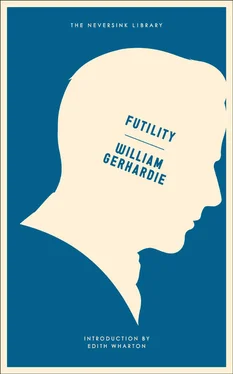“ ‘ Du bist verrückt, Nikolai,’ I repeated. ‘Wahnsinnich .…
“And then I thought of my people. And then I cried.…”
She fumbled for her handkerchief. She sobbed again. Again I dashed for a glass of water, this time doing the job gallantly, efficiently, as though I had been doing that sort of thing all my life.
She was bent on going on.
“I cried and he cried with me and tried to console me, but I only thought of what I could say to stop him from taking this mad, disastrous step.
“He said, ‘I know it is terrible, heartbreaking for you, Fanny, and the children.…’
“The children, Andrei Andreiech — I had forgotten them! I who had sacrificed everything for them, divorce and everything else, I had never given them a thought in my disaster. I took it up, Andrei Andreiech, promptly — I even admit somewhat dishonestly — for I was thinking more of myself, of me. Me! me! me! I had lived with him for eleven years!
“ ‘Think of your children,’ I cried. ‘Think of your children, Nikolai. They are yours. They are not my children, and yet I have sacrificed my life and my honour for them.’
“I tried to shame him, but I had to realize that indeed nothing could shame him. I mean, he was already ashamed to his full capacity, conscious of unpardonable sin, conscious of being a bad man, the very worst man — had admitted it all to himself … and was satisfied, as though this confession to himself had cleansed him of his wickedness and he had come out of it, clean, sanctified. That’s what I couldn’t stand, Andrei Andreiech. That he should have told himself that so good and wise and indeed well versed was he in his own wickedness, that there could be no crime, no sin, of which we others could accuse him of which he had not already in his goodness and wisdom accused himself, and so forgiven himself and started clear, afresh, with our lives all wrecked and ruined — that’s what I can’t forgive him. That’s what Nina can’t forgive him. But imagine our consternation when he tells us that he had never really expected our forgiveness when he had made up his mind to marry Zina, his mind evidently having been made up in spite of that knowledge. Why, it would be far better if he had not realized how he had sinned than to plume himself on being a sinner unavoidably and bowing to his fate so readily that you almost suspected that, after the manner of his race, he had bribed it heavily to please him. I am afraid I am overstraining this point, Andrei Andreiech. But it is, after all, the point.
“At last I sprang upon him. ‘What do you propose to do, Nikolai? What do you want us to do? Speak, tell me!’
“He shrugged his shoulders. ‘Live on as we have been living, you looking after the children. What if I am married to Zina? I can still come home every night to you and the children. It changes nothing.’
“ ‘ Nein, besten Dank!’ I said. ‘No, thank you, blagadaru vas! I will return to Germany as soon as you give me the money — provide for me for life. I will not leave otherwise.’ ”
In her great tragedy she was still a sound business woman.
VI
SHE WAS SILENT FOR SOME TIME.
“Andrei Andreiech, does she love him? Cannot live without him? ‘Don’t you believe it,’ I told Nikolai Vasilievich. ‘She will leave you as soon as she has robbed you of your money.’
“ ‘Then I shall come back to you,’ he said.
“ ‘Thank you for nothing,’ I said. ‘I shan’t want you then.’
“Andrei Andreiech, it is all his money. It is really comic, but they all believe him to be preposterously rich. A house-owner in Petersburg! Gold-mines in Siberia! A millionaire! Zina’s people keep telling her, ‘Stick to him, stick to him, don’t let him go. These gold-mines in Siberia, these millions, this house in the Mohovaya!’ That’s all, in fact, they are after. Why won’t his wife give him his divorce and be done with him? Because she believes in the gold-mines. Why does Baron Wunderhausen always hang about here? Why does he run after Nina, Vera, and Sonia? The goldmines again, and the house in the Mohovaya.”
“What of me!” I cried in horror. “I come here every evening, Fanny Ivanovna, and stay till late in the night.”
“Oh, you are different.”
“I shall have to stop coming now.”
“You may as well dismiss at once from your mind any suspicion of an ulterior motive,” said Fanny Ivanovna, rising to the occasion. “They are worth nothing, anyhow … both the goldmines in-Siberia and the house in the Mohovaya.”
“Worthless! You don’t mean it?”
“Absolutely.”
“Do the gold-mines pay nothing?”
“Andrei Andreiech, I have lived with Nikolai Vasilievich now for over eleven years. I don’t remember their ever paying a copeck. They may have paid before my time. But I doubt it. Nikolai Vasilievich, though, is constantly pouring money into them, every month, every year, to keep them going. And this, Andrei Andreiech, what with the money he has to fork out for his wife and Eisenstein and what we spend ourselves and what he gives Zina and her people, who are very poor, and”—she blushed—“what he sends my own people in Germany, and his own sisters and cousins and several other friends and dependents … why, Andrei Andreiech, it takes all he can scrape together.…”
“But the house in the Mohovaya?”
“Precisely. He has been compelled to mortgage the house to be able to manage at all … and keep the other thing going.”
I whistled under my breath. I remember how Baron Wunderhausen had grasped me by the arm one day as he spoke with enthusiasm of Nikolai Vasilievich.
“Rich as Croesus,” he had said.
Well, I felt sorry for him.…
I heard a little nervous cough and a rustle, and a harmless little old man, like a mouse, whom I had not noticed in the room before, rose and walked out.
I was horrified.
“Fanny Ivanovna,” I cried, “that man has heard everything you’ve said.”
“Oh, Kniaz !” she said with undisguised contempt. “He’s heard it all before.”
I felt that this startling news rather took the gilt off the confession. I had flattered myself on being the first, in fact the only one.
“He’s heard it many times,” said Fanny Ivanovna. “Every now and then I feel that I absolutely must confess it all to somebody … no matter who it is.”
“I thought,” I said a little reproachfully, “that you had told nobody, Fanny Ivanovna.”
“Andrei Andreiech!” she cried in her tone of appeal to my sense of justice, “I haven’t spoken of it to any one for more than two weeks. If you hadn’t come here to-day, I don’t know.… I really think I should have confessed it to the hall-porter. You don’t understand.”
“I do understand,” I said, but I could not help feeling misused and mishandled. I almost begrudged her the gallantry of my dash for water — two separate dashes, to be exact — when I remembered that they must have been carried out by other men before me, the confession to-night being, of course, an exact replica of the confessions that had preceded it, Lord knows how many times, like a melodrama with its laughter and hysterics occurring always at the proper interval as it is produced each night. And I was led to revise my recently adopted theory that I was indeed a born confidant by virtue of my understanding personality, tempting strange women into thrilling, exhilarating confessions of their secrets. Rather did I feel the victim of a lengthy and tedious autobiography inflicted on me under false pretences.
I heard the sound of the outer door closing on the old Prince.
“Kniaz,” said Fanny Ivanovna, “is also one of those who live on Nikolai Vasilievich. He always comes here. Never misses a day. Sits, reads, eats, and then goes. And all without uttering a word. When he borrows money from Nikolai Vasilievich he naturally opens his mouth, and then shuts it until the next occasion.”
Читать дальше












